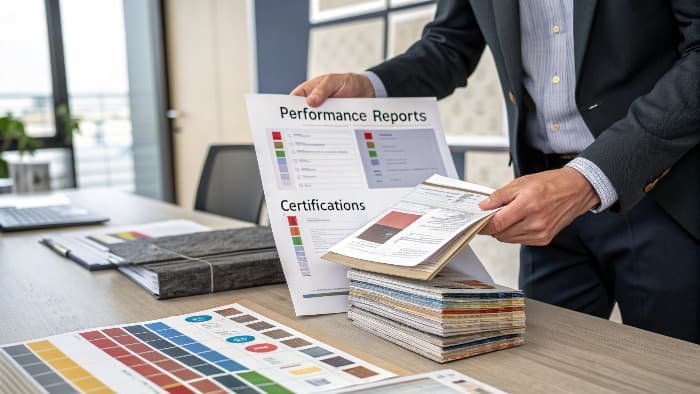Finding the perfect material supplier feels impossible sometimes, right? You’re worried about quality, safety, and if they’ll even deliver on time. This guide will help you choose wisely.
To select the right material supplier for adult toy manufacturing, you absolutely must focus on those specializing in body-safe materials like platinum-cured silicone or TPE. Prioritize their track record for safety, durability, and consistent quality. Also, consider pricing, supply chain stability, and how they handle any quality hiccups.
Choosing a material supplier is a big deal. It’s like picking a business partner, really. If you get it wrong, well, the headaches can be massive – poor product quality, unhappy customers, and even safety concerns. I’ve been there, and trust me, cutting corners here just isn’t worth it. So, let’s dive into what really matters when you’re on the hunt for that perfect supplier. We need to make sure your products shine and your customers feel confident and safe. It’s all about building that trust, from the very first touch.
Why is Material Safety the Absolute Top Priority for Your Adult Toys?
Ever lost sleep worrying if your product materials are truly safe? It’s a huge concern for brand owners, and bad choices can seriously damage your reputation. But what if you knew exactly what to look for?
Material safety is non-negotiable because adult toys have intimate contact with the body. Using unsafe materials can lead to health issues for users and severe legal and reputational damage for your brand. Always prioritize body-safe, non-toxic, and hypoallergenic options verified by testing and certifications.
| Dive deeper Paragraph: When I first started PrivyPlay, this was my number one, non-negotiable point. I mean, we’re talking about products that go into very sensitive areas. You just can’t mess around with that. For me, focusing on suppliers who specialize in materials specifically for adult products, or at least medical-grade applications, was key. Think about materials like platinum-cured silicone. It’s known for being super inert, body-safe, and durable. Then there’s food-grade silicone, which is also a great option, and TPE (thermoplastic elastomer), which can offer different textures and cost points but still needs to be sourced from reputable suppliers who can prove its safety. I always ask for material safety data sheets (MSDS) and any relevant certifications, like RoHS or REACH compliance, especially for European markets. It’s not just about ticking boxes; it’s about genuine peace of mind. I remember one time a potential supplier offered a "cheaper" silicone. Alarm bells! Turns out, it wasn’t platinum-cured and had some questionable additives. Dodged a bullet there. Your customers trust you, and that trust is built on the safety and quality of the materials you choose. |
Material Type | Key Safety Features | Common Certifications |
|---|---|---|---|
| Platinum-Cured Silicone | Highly inert, hypoallergenic, durable, non-porous | FDA-grade, RoHS, REACH | |
| Food-Grade Silicone | Body-safe, non-toxic | FDA-grade | |
| TPE/TPR | Phthalate-free, body-safe (verify source & grade) | RoHS, REACH | |
| ABS Plastic (for bases) | Hard, durable, non-porous (ensure body-safe coating) | RoHS |
Seriously, don’t skimp on this. It’s the foundation of your product and your brand.
How Can You Really Know if a Supplier’s Materials are Consistently Good Quality?
You’ve found a supplier claiming top-notch materials, but how do you really know they’ll deliver consistent quality batch after batch? It’s a nagging doubt that can keep you up at night, worrying about product failures or returns.
Evaluate a supplier’s quality and consistency by checking their performance history, requesting material samples for testing, and asking about their quality control processes. Look for certifications and be wary of suppliers who can’t provide detailed material specifications or consistent sample quality. It’s about long-term reliability.

Dive deeper Paragraph:
Okay, so safety is locked in. Next up is quality and consistency. This is where a supplier’s track record really comes into play. I always ask about their history – who have they supplied before? Can they provide references (though, in our industry, discretion is key, so sometimes this is tricky)? More importantly, I look at their internal quality control (QC) processes. How do they ensure that the silicone they send you in June is identical in quality to the silicone they sent in January? I’m talking about things like durometer (hardness), tensile strength, tear resistance, and even color consistency if you’re doing custom colors. For instance, with PrivyPlay, we have very specific requirements for the feel and durability of our toys. We learned early on that you need to test samples rigorously. Don’t just look at them. Stretch them, boil them (if applicable for sterilization testing), see how they react to lubricants. I once had a batch of TPE from a new supplier that felt great initially, but after a few weeks, it started to get a bit tacky. That’s a no-go. A good supplier should be able to provide batch test reports if you ask. It’s also about their willingness to work with you on specifications. If they’re cagey about details or their samples vary wildly, that’s a big red flag for me. Building that consistent quality is what keeps customers coming back.
Here’s a little checklist I mentally run through:
- Request Samples: Multiple samples, if possible, from different batches.
- In-House Testing: Don’t just rely on their specs. Test for feel, durability, smell.
- Ask About QC: What are their internal processes? How do they handle deviations?
- Material Specs: Do they provide detailed datasheets? Are they consistent?
- Small Trial Order: Before a big commitment, a smaller production run can reveal a lot.
It’s a bit like detective work, but so worth it.What’s the Deal with Price vs. Reliability in Material Sourcing?
Everyone wants a good price, right? But then you hear horror stories about cheap materials failing or suppliers disappearing. How do you find that sweet spot between cost-effectiveness and a supplier you can actually count on?
While price is a factor, it shouldn’t overshadow reliability and quality. Opting for the cheapest material supplier can lead to inconsistent quality, product failures, and supply chain disruptions, ultimately costing more. A slightly higher price for proven reliability and stable supply is a better long-term investment.
 Dive deeper Paragraph: Ah, the age-old dance between price and quality. It’s tempting, especially when you’re looking at spreadsheets, to go for the cheapest material option. I get it. When I was starting PrivyPlay, every penny counted. But I learned a hard lesson pretty quickly: in the adult toy world, cheap materials often mean expensive problems later. Think about it – if a material is significantly cheaper, there’s usually a reason. Maybe it’s lower-grade silicone, maybe the TPE has fillers that compromise its safety or durability, or maybe the supplier cuts corners on their quality control. The "savings" you make upfront can get wiped out fast by customer returns, bad reviews, or even worse, a product recall. That’s brand damage you can’t easily fix. So, my approach now is to look for fair value, not the rock-bottom price. I consider the total cost of ownership. This includes the material price, yes, but also the cost of potential defects, delays, and the impact on my brand’s reputation. A reliable supplier who delivers consistent, high-quality materials on time might cost a bit more per kilo, but they save me headaches and protect my business in the long run. It’s about finding a partner who understands that quality isn’t just a feature; it’s the foundation. For example, we use a specific grade of platinum-cured silicone that isn’t the cheapest, but its consistency and proven safety record mean fewer production issues and happier customers for PrivyPlay. That, to me, is true value. Consider this: |
Factor | Cheaper Supplier Risk | Reliable Supplier Benefit |
|---|---|---|---|
| Material Cost | Low initial outlay | Higher initial outlay | |
| Quality | Inconsistent, potential safety issues, poor feel | Consistent, safe, good tactile properties | |
| Defect Rate | Potentially high, leading to returns/rework | Low, leading to higher customer satisfaction | |
| Brand Impact | Negative reviews, loss of trust | Positive reviews, stronger brand loyalty | |
| Supply Chain | Unpredictable, potential for delays | More stable, better communication | |
| Long-Term Cost | Higher due to problems, returns, brand damage | Lower due to fewer issues and stronger brand |
It’s a strategic decision, not just a procurement one.
How Do You Make Sure Your Supplier Can Handle Problems and Keep Things Stable?
So, you’ve found a supplier with great materials at a decent price. But what happens if there’s a hiccup in quality, or a global event disrupts the supply chain? Can they actually handle the pressure and keep your business running smoothly?
Ensure a supplier can handle problems by discussing their contingency plans for quality issues and supply disruptions. Assess their communication responsiveness, their willingness to resolve problems fairly, and their capacity to manage fluctuating order volumes. A proactive and transparent supplier is key to stability.

Dive deeper Paragraph:
This is where the "partnership" aspect really comes into focus. A supplier isn’t just someone who sends you stuff; they’re a critical link in your business. What I look for – and what we strive to be at PrivyPlay for our clients – is stability and a solid plan for when things (inevitably) don’t go perfectly. First off, supply chain stability. I ask potential material suppliers about their raw material sources. Do they have multiple sources, or are they reliant on a single upstream provider? What are their typical lead times, and how do they communicate potential delays? Especially after the global disruptions we’ve all experienced, this is more important than ever. Then, there’s the ability to handle quality issues. No supplier is perfect 100% of the time. What matters is how they deal with a problem. Do they get defensive? Do they try to shift blame? Or do they work with you to understand the issue, find a solution, and implement corrective actions? I always have a frank discussion about this upfront. "What happens if a batch doesn’t meet spec? What’s your process for returns or credits?" Their answers tell you a lot. For PrivyPlay, we try to be super transparent. If there’s an issue from our end, we own it and fix it. I expect the same from my material suppliers. Responsiveness is also huge. If I have an urgent query, I need to know I’ll get a timely response. This builds trust and makes navigating challenges much smoother. It’s like, I remember a time when a shipment of TPE pellets had a slight color variance. It wasn’t a safety issue, but it could have affected the final product’s aesthetics. Our supplier was immediately on it, investigated, and expedited a replacement batch while working with us on how to utilize the slightly off-color batch for internal testing. That’s the kind of problem-solving you need.
Key questions to ask:
- What are your lead times, and how do you manage them?
- What’s your process for handling a quality complaint or a defective batch?
- How do you ensure supply chain resilience (e.g., multiple raw material sources, buffer stock)?
- Can you support low MOQs and fast sampling, especially for new product development? (This is crucial for us entrepreneurs!)
- How do you communicate delays or issues?
A supplier who is upfront and proactive here is worth their weight in gold.Beyond the Basics: What Other Factors Make a Great Material Supplier Partnership?
You’ve covered safety, quality, price, and stability. Seems like a lot, right? But are there other, less obvious things that can turn a good supplier relationship into a great one, truly helping your brand grow?
Beyond core criteria, a great material supplier offers innovation by suggesting new or improved materials, understands market trends, provides excellent communication and technical support, and shows flexibility with MOQs and sampling. They act more like a partner invested in your success.

Dive deeper Paragraph:
This is where you separate the good suppliers from the truly exceptional partners. Once all the fundamental boxes like safety, quality, and reliable supply are ticked, I start looking for those extra qualities that can really make a difference to my business, PrivyPlay. For example, innovation. Is the supplier proactive in suggesting new materials or improvements? Do they keep an eye on market trends and share insights? I had a supplier once who approached me about a new type of TPE that had a silkier finish and better tear resistance than what we were currently using. We trialed it, and it was a fantastic upgrade for one of our product lines! That kind of proactive partnership is invaluable. Another big one for e-commerce entrepreneurs like many of us is flexibility. Can they support low MOQs, especially when you’re testing a new product or a niche market? Are they quick with samples? Slow sampling can kill momentum. Fast sampling and reasonable MOQs were a game-changer for us when we were launching new designs. And communication – I mean really good communication. Not just responding to emails, but understanding your needs, anticipating potential issues, and being a genuine sounding board. Sometimes I’ll just call my key supplier contact to bounce off an idea for a new texture or material property. That kind of relationship doesn’t happen overnight, but it’s built on trust and mutual respect. They should feel like an extension of your team. They should be as invested in your product’s success as you are because, ultimately, your success is their success. It’s these "softer" factors that often lead to the most fruitful and long-lasting supplier relationships.
Think about:
- Innovation: Do they introduce new materials or improvements?
- Market Insight: Do they understand adult toy trends?
- Communication: Are they responsive, clear, and proactive?
- Technical Support: Can they help troubleshoot or advise on material processing?
- Flexibility: MOQs, sampling speed, willingness to adapt.
- Long-Term Vision: Do they seem interested in growing with you?
Finding a supplier who ticks these boxes? That’s when you know you’ve struck gold.Conclusion
Choosing the right material supplier is vital. Focus on safety, consistent quality, fair pricing, supply stability, and their ability to solve problems. This builds a strong foundation for your adult toy brand’s success.
